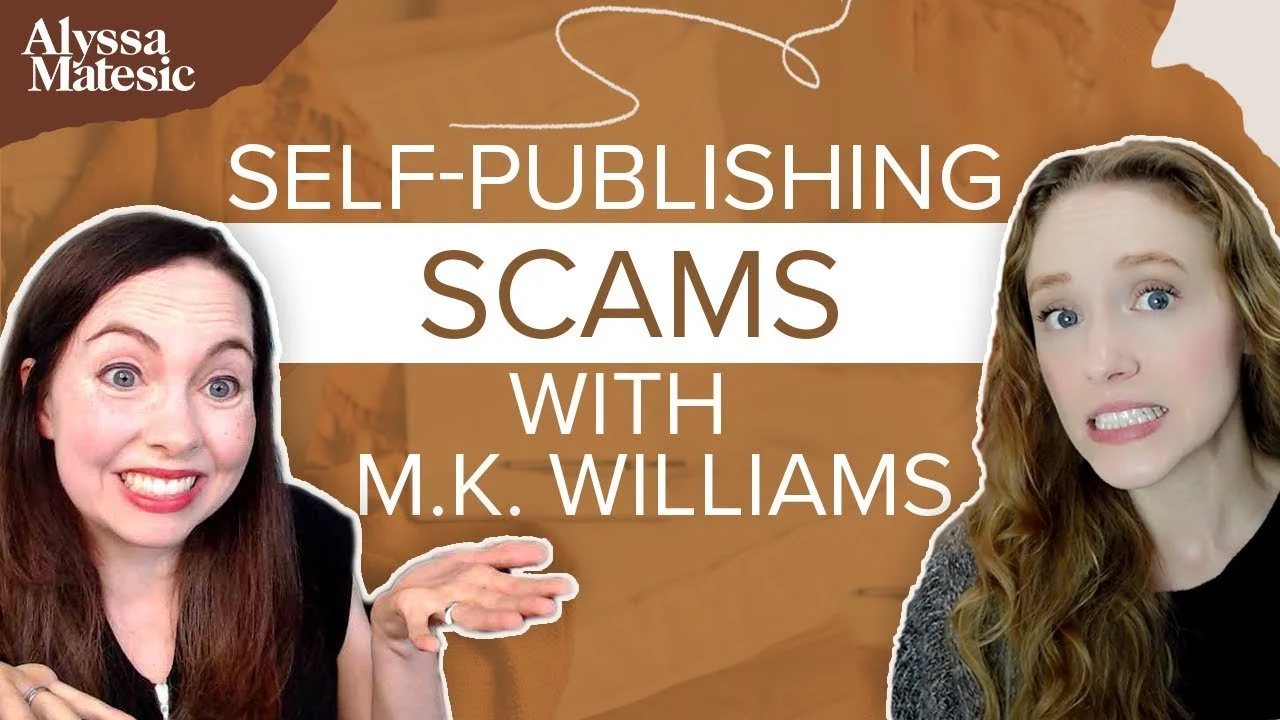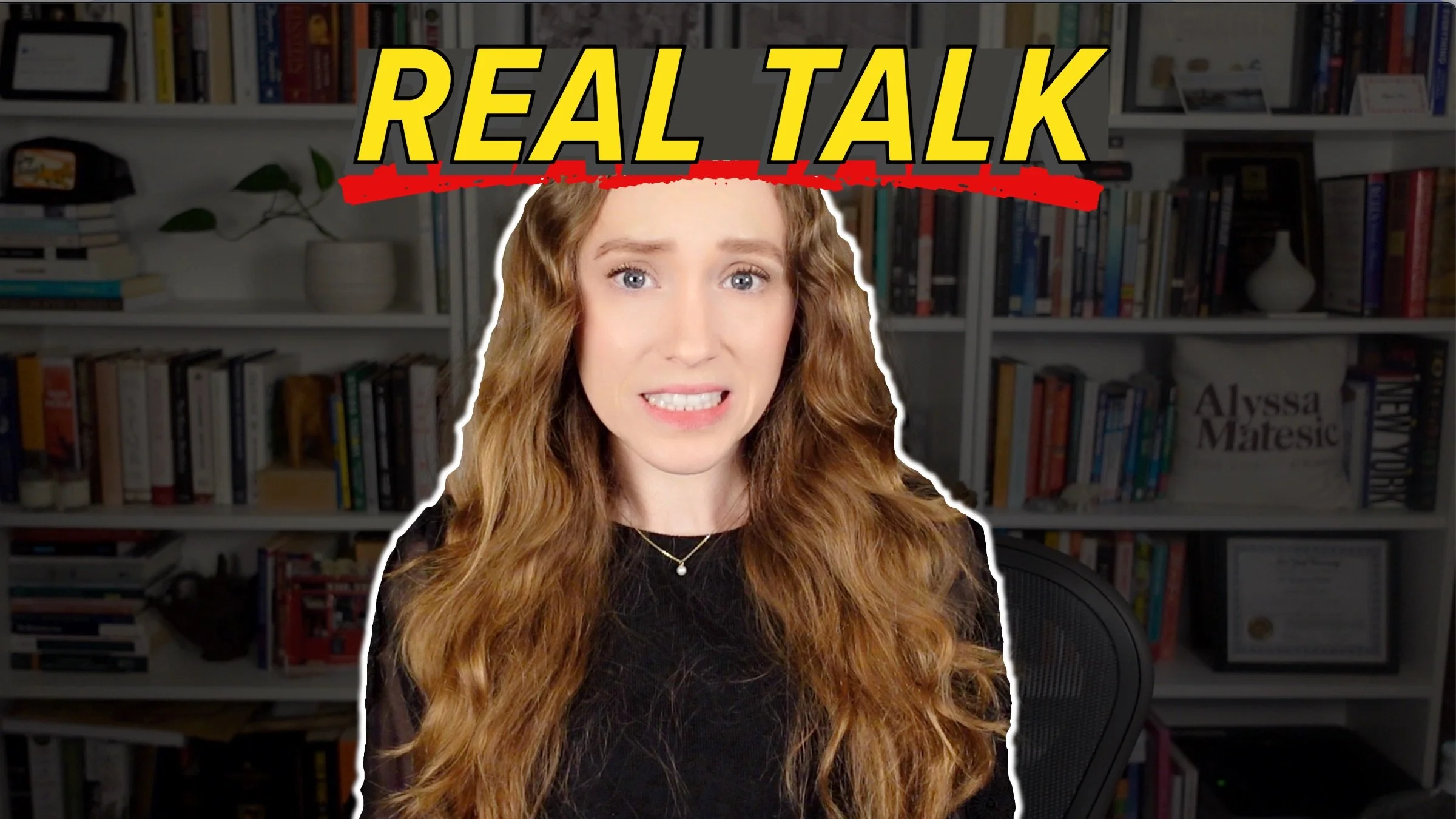The Self-Publishing Pitfalls Every Author Should Know About
HIT PLAY OR READ THE POST BELOW:
If you've decided to self-publish your book and you're in the process of getting it ready for readers, then you're likely discovering it is a massive undertaking that requires so much research, so much dedication, and is often fraught with confusion. Which services do you need to hire people for? Which services can you do yourself? How can you tell if someone is a legitimate publishing partner or if you're the victim of a self-publishing scam?
Unfortunately, we're seeing more and more scammers target authors who are trying to self-publish. It can be really challenging for you to figure out if this is a legitimate service that's actually going to help you get success with your book or if it's really just someone out for your money.
If you've read my blog or follow my YouTube channel, you likely know that I used to work in the traditional publishing side of things, so I have a lot of insights for authors who want to get traditionally published by a major publishing house. Since I don't have a much experience with indie publishing, I sat down with a self-publishing expert who illuminated some of the most common scams and pitfalls of self-publishing.
M.K. Williams is a self-published author who has found a ton of success in her publishing journey and on her own YouTube channel as a member of the beloved AuthorTube community. Read our conversation below to learn about the most common self-publishing pitfalls.
The Self-Publishing Pitfalls of Using a Hybrid Publisher or Vanity Press
Alyssa Matesic: My first question for you is about these so-called hybrid publishers, or what are also known as vanity presses. We're seeing more and more of them pop up in the publishing landscape. How can authors who are planning to self-publish differentiate a reputable publisher from a scam, and what should they look for?
M.K. Williams: The tricky thing with vanity presses is that they don't come out and say, “We're a vanity press.” They call themselves independent publishers, which isn't inaccurate because they are not affiliated with the Big Five, but they're pretty much glorified print shops.
The vanity part in vanity press is that it's all for show. Sure, their logo is on the spine of your book, they're listed on the copyright page, but that's about it in terms of being a “publisher.” You have a massive fee, usually in the thousands, in paying for editing and design services and then printing. That's really what you're getting, but then this person is saying they're the publisher.
Now, if you're thinking of going the self-publishing route and then a publisher reaches out to you out of the blue that you've never heard of? Red flag, sorry. Unless you have a major online platform already, how did they hear about you? Vanity presses charge a fee to authors to publish their books. Real publishers do not charge for publication. In fact, they pay you.
Vanity presses also usually get the rights to your book, so you're paying money and signing over rights. If anyone is representing themselves as a publisher and asking for money, big red flag. Run the other direction.
You can usually do a quick search in several indie publishing or self-publishing groups and forums to see if any other authors have worked with this press and if they had a good experience. Most people who work with vanity presses will at the end say it wasn't a good experience. They're very excited — “Oh, my publisher this, my publisher that” — and then usually about three months, a year later, they're like, “No, this was a horrible experience.” So, you'll be able to find out pretty quickly if that is a reputable company or not from people sharing their experience with you.
AM: I'm totally in agreement — a traditional publisher, for instance, will never ask you for money. They will pay you money because they are buying the rights to publish your book. So, if a publisher is approaching you and saying, “You need to pay me thousands of dollars,” that is a self-publishing red flag, and typically those services are not what you want them to be. There was a report done on hybrid publishers and scam publishers that corroborates everything you're saying in that most people who go this route ultimately are not satisfied with the services, so it's better to avoid it entirely.
I also want to add that there is a blog called Writer Beware that posts about scam publishers and vanity presses and can alert writers to any publishers that are illegitimate. If someone is reaching out to you and you want to check their legitimacy, you can run a search on that blog.
How to Tell a Legitimate Publishing Partner from a Self-Publishing Scam
AM: So now let's get into my second question: Do you need a publishing partner when you're going the self-publishing route? Are there any benefits to working with one of these hybrid publishers, or is it better to just do it all on your own?
MKW: This is probably an infuriating answer, but it depends on a lot of different factors. On one end of the spectrum, let's say you enjoy learning things by getting your hands messy. You want to try to figure out the different systems and the processes. You may not need a partner to help you, but you can learn a lot from the information that's out there to make the process less stressful.
On the other end of the spectrum, let's say you're looking to publish a leadership and management book to complement your thriving consulting business. You may feel like you don't have the time to take away from your business to learn about self-publishing, at which point working with a hybrid publisher or book coach might be a big benefit to you. They know self-publishing and can get the book across the finish line, and you get to focus on your business. In that case, the fees you pay are for this person's time in managing the project, paying for editing and design, etc. You retain all the rights to your book in future royalties.
And there's so many different options in between. Ideally, you want to know yourself. What are your strengths and weaknesses, and what's your time availability? If you feel like you absolutely have to have this book out by a certain date to support your business, working with a partner is going to be super helpful for you, and you need to look at that as a business investment. If you don't have a lot of money to invest in self-publishing your book, then you're going to need to invest your time to learn some of these processes.
What I want to leave you with is that self-publishing is not solo publishing. There are very reputable people out there who can help you. Maybe it's formatting your book, maybe it's learning how to use the software that you bought to format your book (in which case you can find free videos and tutorials online), or maybe it's for your book cover. Maybe it's somebody who just knows how to upload things to the different platforms, and they're going to tell you, “Yes — click this button here, push this here; boom, you're done.” There are always people out there who can help you depending on what you have to invest.
AM: I love your point about self-publishing not having to be solo publishing. If you need help, you absolutely should get it. If it makes more sense from a business perspective for you to outsource some of the work of self-publishing, then that absolutely makes sense.
I think where the difference lies, and what we're talking about here, comes down to communication and expectations. Maybe it doesn't make sense for a debut author of a fantasy romance to invest thousands of dollars to work with a hybrid publisher who really isn't going to guarantee any sort of success once the book is launched. However, if someone has a built-in platform and a very clear launch plan for their book, and it makes sense for them to spend some money in order to get it over the finish line, then that could be something that makes sense. Everyone's case is different.
How to Avoid Self-Publishing Service Scams When Hiring Professionals
AM: Talking about potentially getting outside help and paying for services, what are some self-publishing red flags to watch out for when you are reaching out to professionals and/or companies that provide those services?
MKW: When you're looking to work with a professional, there are definitely a few red flags to look for. The first one is how long have they been doing this? Did they just put up their website and payment form last week? Now, I don't want to say that and make it seem like somebody new to offering their services isn't going to do a good job. They may do a very good job and they may do it at a lower rate because they're just starting out. But having a track record of helping authors is something to look for. Not only will they follow through on whatever service it is — and you'll be able to see that from that track record — but you also will be confident that they know self-publishing: the platforms, the system requirements. Just because somebody is a great graphic designer does not necessarily mean they're going to be a great book cover designer for all the nuance and the technique and the technical elements they're going to need to be aware of.
The second red flag to look out for when looking at different publishing-related services is communication. Do they make you pay for their services before you even have a chance to connect via email or a phone call? Huge red flag. This is your money; you should definitely be able to discuss with them what the project is, understand if you're a good fit, and if they're going to be communicating with you. If they aren't getting back to your emails when you ask questions about their services or they just aren't timely, find someone else. Maybe they're just already overloaded with client work, or maybe they just aren't good at communication. Either way, communication is the number-one key to success in working with a contractor or a professional for helping to self-publish your book.
One thing to absolutely look for that I would say is a green flag is for the Alliance of Independent Authors or IBPA (Independent Book Publishers Association) seal on their website. These organizations vet new services in the indie author space and only give this seal to those who they can earnestly recommend to authors. Just because a company doesn't have this deal doesn't necessarily mean that they are not high quality; they just may not have applied for that yet. But seeing that seal definitely should help you feel more confident that they are a team that you can work with, and that if something goes wrong you actually have this independent party that's a watchdog that you can report it to.
AM: Such amazing tips there. I love what you said about making sure that the professional or the company has a track record of experience working with authors and helping them to success, and your point about communication. I am a developmental book editor; that's my full-time job, and I work with authors who self-publish. It is so important to me that we set clear expectations, that they know what they're getting from their services with me, that they understand my background, that they've seen books I've worked on before we enter into that collaboration. So, I'm really glad and appreciate that you brought all of that up. And that point about the seal to watch out for is a really helpful tip.
How to Avoid Self-Publishing Pitfalls After Publication
AM: My next question has to do with what happens after the book is published. At that point, what self-publishing pitfalls and scams should authors be looking out for? For example, I know that some authors get these random emails out of the blue from people claiming to be film agents or people claiming that they're going to help their book skyrocket to a bestseller list. What are your opinions on those?
MKW: About once a week, even earlier today, I get an email that just has the title of one of my books in the subject line. Inside is an offer to promote my book to this massive audience of fans for a certain number of dollars for this package. There's no website link in the email to tell me who the company is, and they don't tell me anything else about the size of their audience — just that it's a massive audience. Don't give these people your money. In general, anyone reaching out to you first to promote your book — buyer beware.
It's best for you to do your own research on which book promotion services appeal to readers in your genre, that their email practices are compliant, and that you know what you're getting in exchange for this fee. Definitely be incredulous when anybody is just cold emailing you with an amazing promotion for your book.
Another one is film agents asking for rights for your book. Now, if this happens, usually you're thinking, “Oh my gosh, my dreams are coming true!” The second someone wants to talk about rights for your book, find a lawyer. If you don't know any, post in one of the many self-publishing groups or forums. Someone in there either is a lawyer in their day job or they will know someone who is a lawyer who can help you. It may very well be a legitimate offer, which is very exciting, but don't agree to give over any rights until you've spoken to a lawyer.
If it's a scam, a lawyer is definitely going to scare them away. If it's legit, then they should have an offer amount for rights, a plan on when they would produce that film, and they may even be producing a contract for you to sign that you're obviously going to want that lawyer to vet. There are going to be certain hallmarks of somebody who's legit versus somebody who's not, and a lawyer is going to scare away the scam artists.
AM: More great insights here. I think your tips really come down to not reacting so suddenly to these random cold emails and being skeptical first — making sure you take the time to see, “Who is actually contacting me? Is this a legitimate person?” and then seeking help and getting a lawyer's opinion if it has to do anything with rights. I think it comes down to taking a breather. Even though the email might be really exciting, and you might want to give that person a hundred dollars to promote your book to thousands of people, take a step back. Do your research and ask others before proceeding.
The Biggest Self-Publishing Pitfalls Authors Face
AM: My last question here is a more general one: What is the biggest pitfall that you see self-publishing authors fall into, and what should they do instead?
MKW: Hearing all of this, you may be a little nervous to self-publish, but this is just life. Scammers are out there; we all just have to be very conscientious of it. You're smart; if something smells funny, if it looks a little off, it's probably off. But the biggest pitfall for self-publishing authors isn't any of these external items — it's definitely internal, and it's not having a clear goal.
I see this happen all the time. You might be thinking, “My goal is to self-publish my book.” Okay, but how? Why? What's your vision for the book? Where will readers find it? You need to get really specific on your vision and your goal for the book because there are so many different avenues that you can take to get you the same result. There's like half a dozen places where you can upload your book and it ends up on Amazon.com. Which one's right for you?
If you don't have a clear goal or vision for your book, it's really tempting to look at what someone else is doing or what a guru told you on a podcast and just copy that. But maybe that advice isn't best for your genre or what your vision for the book is. Or, maybe you just have a few days of low book sales and then one of those scam emails comes your way. Having a clear vision and goal will help you to stay on track, publish your book, and avoid most of these potential self-publishing pitfalls.
AM: Absolutely. Goal-setting is so important, and I think also will help mitigate any potential discouragement that comes after you publish your book. I often see self-published authors feel down because they publish their book and then don't make the sales that they want. But having those goals set and a plan in place before all of that can then help you address that disappointment and set your expectations properly. Have you actually taken the steps needed to get your book in front of readers and makes those sales? If not, what are those steps? Go back to that plan and revisit it, and make sure that you're actually executing on it.
Now that you know about the scams and pitfalls of self-publishing, I hope that you feel more empowered to embark on your own publishing journey, whatever that may be.
Thanks so much for reading, and happy writing!






